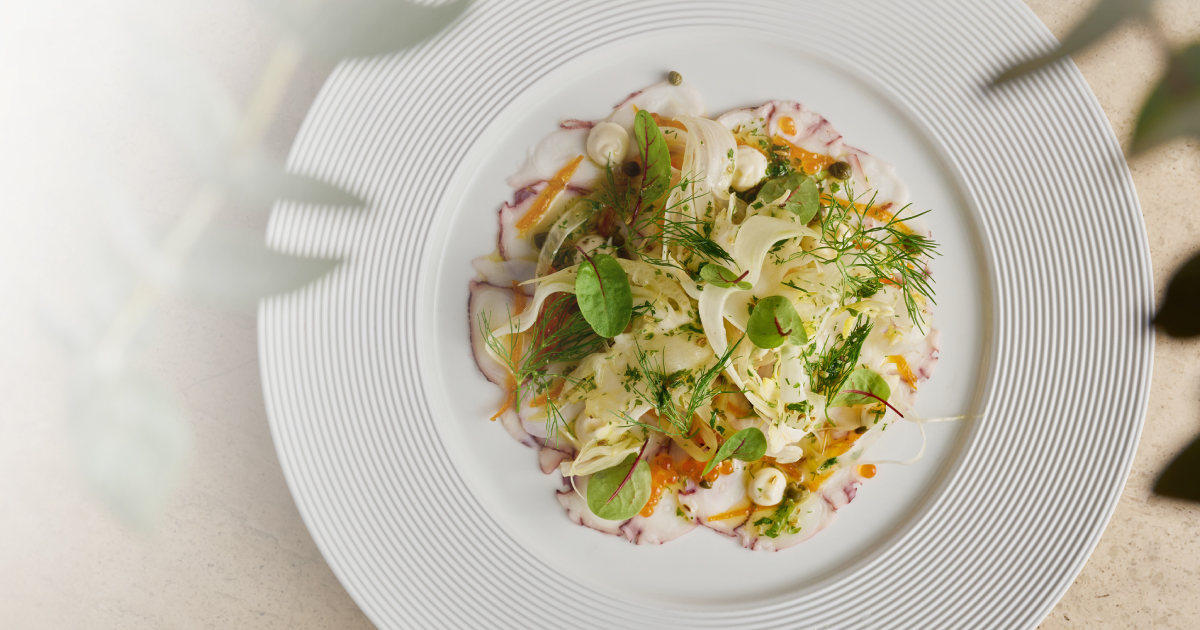

Balancing the flavors in Greek cuisine
Greek cuisine is known for its vibrant flavors, fresh ingredients and rich culinary traditions, reflecting the country’s cultural history and diverse regional variations. A key characteristic is the way we combine and balance the flavors and ingredients of our main staples. These include the aromatic and wild herbs, spices, garlic, olive oil and citruses, all of which are essentials in the Greek-Mediterranean diet. You then have the dairy, the rich seafood offerings, meat on the mainland, legumes and grains, which have also all collectively contributed to the birth of Greek Cuisine.
Rich produce from diverse regions
Greek cuisine has a rich, ancient history and includes several regional variations, reflecting the diverse influences that have shaped the culinary landscape. Cuisine from northern Greece is heavily influenced by specialties. In Cretan cuisine, the integral components include aromatic herbs and vine leaves. Importantly, the high-quality olive oils contribute to the unique flavors neighboring countries, resulting in dishes rich in flavor. The region is known for its hearty and meat-focused dishes, with bold spices and seasonings featuring in the many and aromatic profiles of Cretan dishes, making them true representatives of the region’s culinary heritage.
Island delights
The eastern Aegean islands offer numerous culinary delights, each with its own unique flavors and specialties, from fresh seafood and aromatic herbs to delightful sweets. Diners can indulge in a sumptuous selection of dishes like local fish soups, herb-filled cheese pies and mouthwatering desserts, soaked in honey syrup. The Ionian islands have a diverse cultural history, which includes influences from both ancient Greece and Venice. The Venetian rule, in particular, has left a lasting impact on the local cuisine, which blends traditional Greek ingredients with Italian culinary techniques. Cycladic cuisine is a culinary ark, with the sea around the Cyclades offering the islands wonderful and abundant treats. These include divine seafood and grilled fish, dried or salted, and cooked with vegetables. Sheep and goats are few in number, but provide milk which is rich and excellent for cheese. One of the main ingredients of the Cycladic pastry is honey, which is in plentiful supply, thanks to the low vegetation and thyme available there. Aromatic plants and herbs also play their part by adding those delightful flavors that are immediately recognizable on the palate.
Tried and tested traditions in Greek
From the era of the ancient Greeks until not so long ago, it was common to use simple cooking methods over an open fire, such us grilling, roasting and stewing. The preserving technique of pickling, drying, salting and smoking was developed out of necessity, to serve people’s daily needs, since there were no refrigeration options. In the northern region of Greece, you also found the less common technique of 24-hour cooking in an underground fire, mostly used for meat dishes. This method relied on the length of time and the soil to enrich the flavors and tenderize, giving the meat a mellow texture. Cooking took place in a clay pot, which is sealed tight, allowing for a subtle evaporation and caramelization to take place, enhancing the aromatic flavors and taste.
Outside influences
Over time, Greece became a melting pot of cuisines, with neighboring civilizations introducing new ingredients and culinary techniques. The incorporation of fish, seafood, meats and various vegetables into dishes expanded, creating a more diverse and sophisticated flavor palate. The 20th century marked a new stage in Greece’s culinary history, with the promotion of local products, a return to traditional cooking techniques and an emphasis on quality ingredients. These became the fundamental pillars of our culinary revolution.
Good food, good company
A central aspect of Greek food culture is the shared approach toward meals. Greek cuisine is a testament to its people’s love for good food and good company. Eating is a social event, where family and friends gather to share food, stories and laughter.
This tradition of shared meals fosters a sense of community and belonging. It’s not uncommon for meals to last several hours, especially during weekends or celebrations, reflecting the value Greeks place on hospitality and togetherness. We should also mention the bread here as well, which is an essential staple and present at any meal on a Greek family’s table.
Supporting small-scale producers
Modern interpretations of classic dishes are becoming increasingly popular, thanks to a surge in creativity among chefs who are reimagining these traditional dishes and giving them a modern twist, whilst staying true to the essence of Greek culinary heritage. Sustainability, meanwhile, has inspired Greek chefs to embrace local, seasonal ingredients to not only enhance the freshness and flavor of dishes, but also support small-scale producers. From freshly caught seafood to sun-kissed vegetables, the emphasis on local sourcing is transforming the Greek dining experience.
As the world becomes increasingly health-conscious, Greek cuisine is also sharpening the focus on products such as olive oil, whole grains, legumes and fresh produce. We’re seeing increased demand for Mediterranean-diet-inspired dishes, reflecting a growing awareness of health and wellness.
Fusion flavors and global influences are another trend that has been embraced by Greek chefs, alongside elevated dining. Gone are the days when Greek cuisine was confined to rustic tavernas and seaside eateries. In 2024, diners can expect to find high-end dining experiences that rival the finest establishments around the globe. Showcasing everything from Michelin-starred restaurants to chic rooftop bars, Greece is emerging as a glorious culinary destination.
Meeting diners’ changing demands
Today, Greek cuisine continues to evolve and captivate palates worldwide. Greek gastronomy is an authentic, high-quality and long-lasting cuisine, currently on a path of redefinition. As we edge closer
to 2025, I believe demand for healthy food will continue to rise and more vegan and vegetarian concepts will appear in hospitality. Organic fusions and sustainability will lead the way in both restaurants and food markets. As a chef, I view diversity as key in my work, which comes with knowledge of the product and its source. As a consumer, my expectations are aligned with this. We can expect to enter a new chapter of wellness on the culinary scene, driven forward by growing awareness.

Vlassia Anagnostou,
head chef at Avli by tashas in Dubai,
@vlassiaanagnostou
avlibytashas.com










